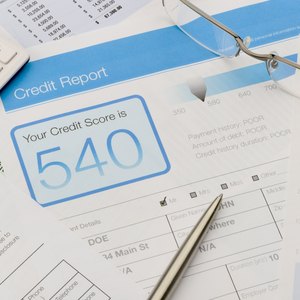
There is no quick fix for repairing bad credit, but consistently making your payments on time will slowly rebuild your score. Making payments promptly for six months is certainly a step in the right direction for improving your credit score, but how much your score goes up depends on how bad it was to begin with. According to Experian, any score about 700 is considered good with scores in the 800 range falling in the excellent category. Those are the numbers you'll want to strive for.
Understanding Credit Misuse
It is easy to become tangled in credit issues, especially when you're using credit for the first time. Credit card debt can sneak up on you, especially if you use cards with low introductory interest rates that jump after an initial time or if you don't have a steady income to ensure on-time repayment of debt obligations. Avoid taking on more debt than you can repay and don't apply for or use new credit while you’re making repair efforts.
Making On-Time Payments
Making sure every bill is paid on time will start to improve your credit score, even after just six months. Consider setting up automatic withdrawals from your checking account or make online payments to meet every debt deadline. Paper checks can be lost or delayed and applied to your account late, so the electronic approach gives you more control as well as an e-record to show when and how you made your payment and when it was credited to your account.
Other Credit Improvement Tips
In addition to making on-time payments, pay down the balance on outstanding debt as much as possible to boost your credit score. The more you can pay down in that six-month period, the better. Talk to a qualified nonprofit credit or debt counselor to learn more about budgeting and repairing your credit. The Federal Trade Commission offers tips on how to find a legitimate agency or professional to help you in this area.
Using Credit Monitoring
When you're working to improve your credit score, monitor your credit on a regular basis so you can see the positive impact your on-time payments are making. This is a good habit to get into because it can protect against identity theft and alerts you to potential fraud or misuse of your personal credit. If you see inaccuracies or unfamiliar accounts on your report, notify the credit bureau right away. Fixing mistakes can boost your credit score.
References
- New York State Department of Financial Services: Understanding Your Credit Report and Your Credit Score
- Yahoo Finance: How a Good Credit Score Can Save You More Than $100,000
- Federal Trade Commission: Free Credit Reports
- Experian: What Is a Good Credit Score?
- Consumer Financial Protection Bureau. "3 Common Credit Issues and What You Can Do to Fix Them." Accessed May 12, 2020.
- Debt.org. "Secured Credit Cards." Accessed May 12, 2020.
- Consumer Financial Protection Bureau. "Six Tips to Consider When You’re Offered a Retail Store Credit Card." Accessed May 12, 2020.
- Experian. "Will Being an Authorized User Help My Credit?" Accessed May 12, 2020.
- Federal Trade Commission. "Co-signing a Loan." Accessed May 12, 2020.
- My FICO. "What's in my FICO® Scores?" Accessed May 12, 2020.
- Consumer Financial Protection Bureau. "How Do I Get and Keep a Good Credit Score?" Accessed May 12, 2020.
- Federal Trade Commision. "Payday Loans." Accessed May 12, 2020.
- Experian. "How Long Do Late Payments Stay on Credit Reports?" Accessed May 12, 2020.
- Experian. "Inactive Credit Card: Use it or Lose it?" Accessed May 12, 2020.
- Federal Trade Commission. "Disputing Errors on Credit Reports." Accessed May 12, 2020.
- Federal Trade Commission. "Free Credit Reports." Accessed May 12, 2020.
- Consumer.gov. "Your Credit History." Accessed May 12, 2020.
Writer Bio
Lisa McQuerrey has been an award-winning writer and author for more than 25 years. She specializes in business, finance, workplace/career and education. Publications she’s written for include Southwest Exchange and InBusiness Las Vegas.

